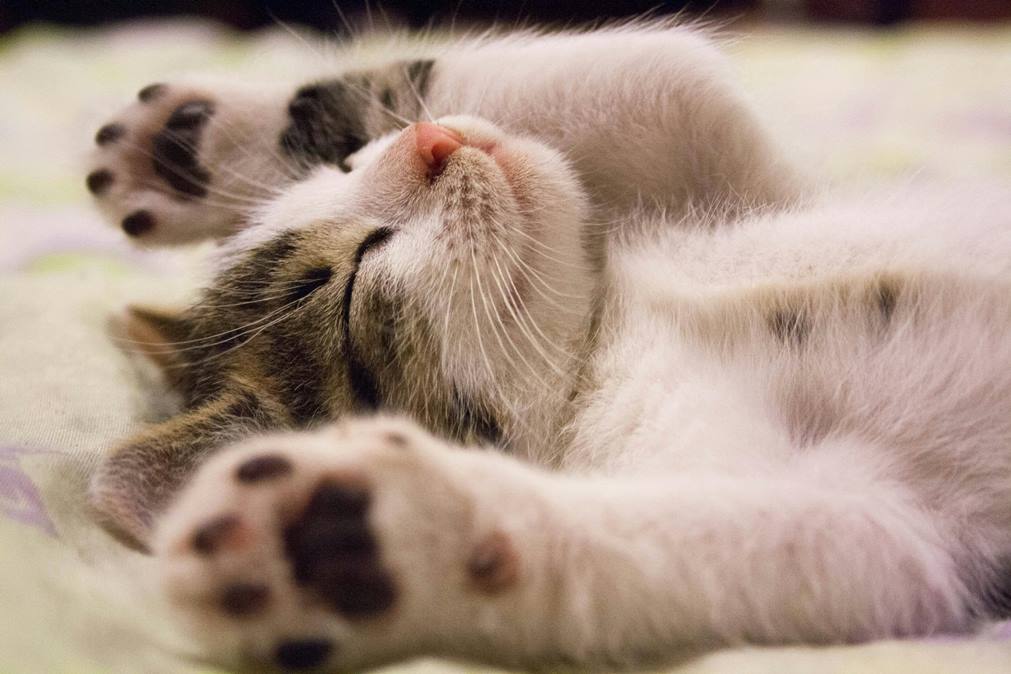In this Article
Les chats sont des créatures sensibles qui réagissent souvent aux changements de leur environnement par des signes de stress subtils, ou moins subtils. Qu'il se cache sous les meubles ou fasse un toilettage excessif, l'anxiété féline peut perturber leur bien-être et fragiliser le lien avec leurs maîtres. Heureusement, des techniques naturelles d'apaisement et des remèdes pour chats stressés peuvent soulager leur anxiété sans recourir à des médicaments. Dans cet article, nous explorerons des astuces scientifiques pour la relaxation et des solutions contre le stress félin , des phéromones aux pièces calmes, afin de créer un foyer plus calme et plus heureux pour votre chat.
Comprendre l'anxiété féline : pourquoi les chats sont stressés
L'anxiété chez les chats trouve souvent son origine dans leur évolution de chasseurs solitaires. Contrairement aux chiens, les chats recherchent la prévisibilité et le contrôle, rendant les perturbations telles que les bruits forts, les nouveaux animaux ou un réaménagement de la maison profondément perturbantes. Une étude de 2023 du Journal of Feline Medicine and Surgery a révélé que 74 % des chats présentent des comportements liés au stress à un moment donné, dont 30 % présentent des signes chroniques tels que le marquage urinaire ou l'agressivité. Les déclencheurs courants incluent le déménagement (qui touche 1 chat sur 5, selon un rapport de l'ASPCA de 2024), les visites chez le vétérinaire, ou même des changements subtils comme une nouvelle odeur dans la maison.
Reconnaître l'anxiété est la première étape du traitement. Les symptômes vont de la dilatation des pupilles et des oreilles aplaties au toilettage excessif, qui, selon l'American Veterinary Medical Association (AVMA), peut entraîner une perte de poils chez 15 % des chats stressés. En utilisant des méthodes naturelles d'apaisement pour chats , vous pouvez intervenir rapidement et empêcher l'aggravation de ces comportements.
Le pouvoir des phéromones
L'une des solutions les plus efficaces contre le stress félin est l'utilisation de phéromones synthétiques, qui imitent les substances calmantes naturellement produites par les chats. Les phéromones faciales félines, libérées lorsqu'un chat frotte ses joues contre des objets, signalent sécurité et familiarité. Des produits comme Feliway, lancés dans les années 1990 et perfectionnés grâce à des décennies de recherche, reproduisent cet effet. Une étude de 2022 publiée dans Veterinary Record a montré que 82 % des chats exposés à des diffuseurs de phéromones présentaient une réduction de leurs comportements de stress, comme se cacher ou se gratter, en deux semaines.
Pour utiliser des phéromones afin de soulager l'anxiété de votre chat , placez un diffuseur dans sa pièce préférée ou vaporisez-en sur son couchage. L'AVMA recommande de suivre un programme régulier, car les effets sont à leur maximum après 7 à 10 jours. Dans les foyers où vivent plusieurs chats et où les tensions sont souvent vives (40 % de ces foyers signalent des agressions félines, selon une enquête menée en 2024 par le Banfield Pet Hospital), les phéromones peuvent favoriser l'harmonie sans effets secondaires.
Créer un sanctuaire tranquille
Un espace sécurisé dédié est essentiel pour la relaxation des chats . Les chats recherchent des endroits où se réfugier, loin du chaos, et des études le confirment : une expérience menée en 2021 par l'Université de Californie à Davis a révélé que les chats ayant accès à un refuge tranquille présentaient un taux de cortisol (hormone du stress) inférieur de 25 % à ceux qui n'en avaient pas. Ce remède contre le stress est simple à mettre en œuvre : choisissez un coin peu fréquenté, ajoutez un lit ou un bac douillet, et ajoutez un objet familier, comme une chemise usée, imprégnée de votre odeur.
La hauteur est également importante. Les chats se sentent en sécurité lorsqu'ils sont au-dessus de leur environnement, une caractéristique liée à leur besoin ancestral de surveiller les prédateurs. Une enquête menée en 2023 par l'AAFP a révélé que 65 % des propriétaires ayant aménagé des espaces verticaux, tels que des étagères ou des arbres à chat, ont constaté un comportement plus calme en un mois. Combinez cela à un éclairage doux et à un minimum de bruit, et vous créez un havre de paix naturel pour les chats, source de solutions au stress .
Remèdes à base de plantes : les agents apaisants de la nature
Les plantes offrent une autre solution naturelle pour apaiser les chats . L'herbe à chat, un membre de la famille de la menthe, est connue pour son effet euphorisant sur 70 % des chats (selon une étude du Cornell Feline Health Center de 2020), mais elle possède également une phase apaisante moins connue après l'excitation. Saupoudrez de l'herbe à chat séchée sur un jouet ou un griffoir et regardez votre chat se calmer après une courte période de jeu. Pour les 30 % de chats insensibles à l'herbe à chat, des alternatives comme la vigne argentée ou la racine de valériane peuvent être efficaces ; 50 % des chats y répondent, selon une étude vétérinaire japonaise de 2022.
La camomille, sans danger à petites doses, est une autre option. Une cuillère à café de tisane de camomille froide mélangée à de la nourriture humide peut soulager une légère anxiété. L'AVMA recommande toutefois de consulter d'abord un vétérinaire, car des quantités excessives peuvent provoquer des maux d'estomac. Ces remèdes à base de plantes pour chats stressés puisent dans la pharmacie naturelle et offrent un soulagement doux lorsqu'ils sont utilisés avec discernement.
Le rôle du jeu et de la routine
L'exercice est un puissant outil de réduction de l'anxiété chez les chats. Une étude de 2024 publiée dans Applied Animal Behavior Science a révélé que 20 minutes de jeu interactif quotidien réduisaient les marqueurs de stress chez 68 % des chats anxieux. Des jouets comme des baguettes à plumes ou des pointeurs laser imitent la chasse, satisfaisant ainsi l'instinct du chat et libérant son énergie accumulée. Associez cela à une routine régulière – manger, jouer et dormir à des heures prévisibles – et vous renforcerez la stabilité dont les chats ont besoin. L'AAFP note que les chats ayant des horaires fixes sont 40 % moins susceptibles de présenter des comportements de stress tels que des vocalisations excessives.
Sons et parfums apaisants
Le son peut être une solution subtile mais efficace contre le stress félin . Une étude de l'Université d'État de Louisiane (2023) a révélé que la musique classique, jouée à faible volume, diminuait le rythme cardiaque de 79 % des chats de refuge lors d'événements stressants. Des plateformes comme Spotify proposent désormais des playlists spécialement conçues pour les chats, mêlant piano doux et ronronnements. À l'inverse, évitez les bruits soudains : les aspirateurs ou les feux d'artifice augmentent l'anxiété chez 60 % des chats, selon un rapport de l'AVMA de 2022.
Les parfums jouent également un rôle. La lavande et le romarin, sans danger sous forme diluée dans un diffuseur, ont calmé 55 % des chats lors d'une étude vétérinaire britannique de 2021. Cependant, les huiles essentielles doivent être utilisées avec précaution : les versions diluées sont toxiques, et l'ASPCA met en garde contre une application directe. Privilégiez les produits approuvés par les vétérinaires pour des conseils de relaxation pour chats en toute sécurité .
Massage et thérapie par le toucher
Le contact physique, lorsqu'il est bienvenu, est une puissante méthode naturelle d'apaisement pour les chats . Une étude de 2020 publiée dans le Journal of Veterinary Behavior a révélé que des caresses douces réduisaient les signes de stress chez 67 % des chats, notamment lorsqu'elles se concentraient sur la tête et le cou, zones riches en glandes odoriférantes. Commencez par des caresses lentes et évaluez la réaction de votre chat ; le ronronnement ou le pétrissage signalent la détente. Pour les chats nerveux, une brosse de toilettage peut imiter cet effet, en éliminant les poils morts tout en calmant son anxiété.
Alimentation et hydratation : le lien avec le stress
L'alimentation est essentielle au maintien de la santé des chats et influence également leur anxiété. Une alimentation riche en acides gras oméga-3, présents dans les aliments à base de poisson, favorise la santé cérébrale et réduit le stress, selon une étude de 2023 des Cliniques vétérinaires d'Amérique du Nord. La déshydratation, en revanche, aggrave l'anxiété : les chats buvant moins de 30 ml d'eau par kilo de poids corporel par jour présentaient un niveau de stress 20 % plus élevé selon une étude de 2022. Encouragez l'hydratation avec une fontaine pour animaux ; 70 % des chats préfèrent l'eau courante, selon l'AAFP.
Quand demander l’aide d’un professionnel
Si les remèdes pour chats stressés font des merveilles, une anxiété sévère – caractérisée par une dissimulation persistante, un refus de manger ou une agressivité – peut nécessiter une intervention vétérinaire. Une enquête de l'AVMA de 2024 a révélé que 15 % des chats anxieux bénéficient d'un traitement anxiolytique à court terme en complément de méthodes naturelles. Les consultations comportementales, désormais proposées virtuellement par 50 % des cliniques américaines en avril 2025, peuvent également aider à identifier les facteurs déclenchants et à affiner votre approche.
Conseils pratiques pour la relaxation des chats à l'intention des propriétaires
Voici quelques étapes pratiques pour intégrer ces solutions au stress félin dans la vie quotidienne :
- Testez les phéromones : commencez avec un diffuseur dans une zone à fort trafic et surveillez les changements sur deux semaines.
- Construisez un refuge : empilez quelques boîtes ou installez une étagère dans une pièce calme.
- Jouez quotidiennement : passez 15 à 20 minutes avec des jouets interactifs, en vous adaptant en fonction du niveau d'énergie de votre chat.
- Expérimentez avec des herbes : offrez de l’herbe à chat ou de la vigne argentée et voyez laquelle résonne.
- Créez un paysage sonore : jouez de la musique douce lors d’événements stressants tels que les orages.
L'impact plus large : un chat plus calme, une maison plus heureuse
Réduire l'anxiété féline ne concerne pas que le chat : vous en bénéficiez également. Une étude de l'Université du Missouri de 2023 a révélé que les propriétaires de chats calmes déclaraient eux-mêmes une baisse de 30 % de leur niveau de stress, soulignant ainsi le lien humain-animal. En adoptant des techniques naturelles d'apaisement pour chats , vous favoriserez un foyer paisible, libéré des effets secondaires d'un animal anxieux.
Conclusion : Un chemin naturel vers la paix
Depuis le 7 avril 2025, les outils pour soulager l'anxiété des chats sont plus riches que jamais, combinant des remèdes anciens comme les plantes médicinales et des innovations modernes comme la science des phéromones. Ancrés dans l'instinct naturel du chat, ces conseils de relaxation offrent des moyens accessibles et efficaces de soulager le stress. Qu'il s'agisse d'un coin tranquille, d'une mélodie apaisante ou d'une course-poursuite ludique, les solutions contre le stress félin vous permettent de transformer l'univers de votre chat, un instant apaisant à la fois. Votre chat ne vous dira peut-être pas merci, mais son ronronnement en dira long.

